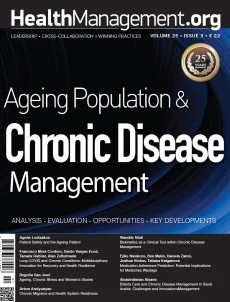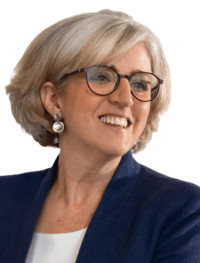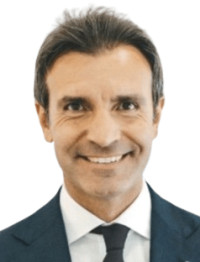Issues
Volume 25 - Issue 3, 2025
ageing population, chronic disease, elderly care, integrated care, digital health, healthcare systems, patient-centred care, health equity, healthcare innovation, Long COVID recovery, biokinetics, predictive tools, medication adherence, AI in healthcare, NHS efficiency, healthcare policy, workforce planning, XR in medical education, value-based care, Zero Click Health, digital transformation, chronic migraine, caregiver support, digital self-care, healthcare safety, multidisciplinary care
Fri, 22 Aug 2025

In this Issue
- Table of contents
- Editorial Board
- Download pdf (print optimised)
- Download pdf (screen optimised)
Editorial
Ageing Population & Chronic Disease Management
READ MOREThe global rise in life expectancy is placing growing pressure on healthcare systems. With age often comes a higher prevalence of chronic diseases, multi-morbidity and complex care needs that stretch traditional service models beyond their limits. Ensuring that elderly individuals receive safe, coordinated and person-centred care is not just a clinical necessity but a societal imperative. With the ongoing...
Spotlight
Düsseldorf: Europe’s Rising Capital for Health Care Congresses
READ MOREDüsseldorf has become a significant hub for health and medical conferences, combining top hospitals, research centres and international events like MEDICA and REHACARE. Its strong infrastructure, central location and support from the Convention Bureau make it easy to host successful events. With excellent transport, diverse hotels and a high quality of life, the city offers a seamless experience for organ...
Measuring the Invisible: The Quanterix Revolution
READ MOREQuanterix is transforming biomarker detection with its Simoa® technology, enabling ultra-sensitive measurement of disease markers in blood. Its platforms (HD-X, SP-X® and SR-X®) support early diagnosis and research across neurology, oncology and more. Clinical validation, including in Alzheimer’s detection, demonstrates global relevance. Through partnerships and scalable systems, Quanterix is helping...
Cover Story
Patient Safety and the Ageing Patient
READ MOREThe ageing population faces increasing patient safety risks due to complex care needs, multimorbidities, reduced physiological reserve and often cognitive decline, all managed within fragmented health systems. Common issues such as delirium, falls, pressure ulcers, malnutrition, dehydration, healthcare-associated infection and medication-related harm are often preventable. Ensuring safer, coordinated and p...
Long COVID and Chronic Conditions: Multidisciplinary Innovation for Recovery and Health Resilience
READ MORELong COVID, now recognised globally as a chronic condition, affects multiple organ systems and demands coordinated, multidisciplinary care. Countries are responding with specialised clinics, rehabilitation pathways and digital innovations. Combining clinical precision, functional recovery and scientific research offers a path to personalised, tech-driven health resilience. Long COVID impacts multi...
Ageing, Chronic Illness and Women’s Stories
READ MOREMany ageing women with chronic conditions face challenges rooted in past hardships, cultural habits and care burdens. Deeply embedded behaviours, digital exclusion and unaddressed grief hinder health management. Systemic gaps, low patient activation and psychological weight further complicate care. Sustainable solutions require empathy, accessible technology, culturally relevant support and recognition of...
Chronic Migraine and Health System Readiness
READ MOREChronic migraine is a disabling, prevalent neurological disorder that remains underdiagnosed and undertreated. It significantly affects quality of life, productivity and health system costs, particularly among women. Many patients lack awareness, self-medicate or do not receive proper care. Despite advancements such as CGRP inhibitors and botulinum toxin, access and adherence remain low. Greater awareness,...
Biokinetics as a Clinical Tool within Chronic Disease Management
READ MOREBiokinetics is a patient-centred, evidence-based exercise therapy that enhances chronic disease management by improving function, reducing hospital readmissions and supporting long-term recovery. Despite being underutilised, it effectively complements pharmaceutical treatment and addresses the physical causes and symptoms of non-communicable diseases. Its integration into multi...
Medication Adherence Prediction: Potential Implications for Medicines Wastage
READ MOREA machine learning model predicting patient adherence to medication shows potential to enhance Clinical Homecare services in the UK. Tailored, early support improves adherence and reduces medicines wastage, with even modest gains delivering significant cost savings. Scaling these interventions nationally could save millions annually and ease NHS pressures while supporting more patients with chronic conditi...
Elderly Care and Chronic Disease Management in Saudi Arabia: Challenges and Innovations
READ MORESaudi Arabia faces a rising elderly population and chronic disease burden, prompting urgent health system reforms. Structural barriers include unequal access, limited geriatric expertise and low digital literacy. Innovations like wearables, AI, telehealth and self-management programmes show promising results. Vision 2030 drives preventive care and digital health adoption, aiming to build an inclusive, sust...
Future Hospital
Rethinking Digital Self-Care: From User Burden to System Leverage
READ MOREThe digital health industry is rapidly developing new self-care apps and tools, but many digital self-care solutions add complexity, increase inequity or fail to scale. Patients need smarter, integrated care rather than just more dashboards. The study redefines digital self-care as a strategic infrastructure challenge rather than merely a tech opportunity. It offers a framework to shift from user burden to...
Advances in Imaging
Smart Cardiac MRI Solutions from United Imaging
READ MORECardiac MRI plays a crucial role in diagnosing complex heart conditions with high precision and safety. United Imaging’s MRI platforms support detailed, radiation-free imaging, offering fast, consistent results even in challenging cases. Their systems enhance patient comfort and streamline workflows through advanced technology and AI features. Designed for long-term value, they align with institutional g...
Robotic Scanning and Phantom Design: Ultrasound Imaging Advances in Moscow
READ MOREMoscow researchers have developed advanced medical phantoms to enhance ultrasound and MRI training, including liver, prostate, foetal and spinal models. Backed by the MosMedMaterial materials database, these phantoms improve diagnostic accuracy and procedural skills. International collaborations support AI development and protocol optimisation. The initiative strengthens medical education, clinical researc...
Digitally Driven Care: Integrating AI in Breast Diagnostics Across Europe
READ MOREAffidea and b-rayz are partnering to integrate modular AI tools into breast diagnostics across Europe. With a focus on clinical support, workflow efficiency and standardisation, the collaboration adapts to local needs while aligning with Affidea’s ESG and innovation goals. Pilots in Switzerland and Lithuania show how tailored AI solutions can enhance care quality and operational performance without disru...
Digital Transformation
From Fragmentation to Flow: Unlocking the Full Potential of Health Data
READ MOREFragmentation continues to limit the full potential of health data across systems. Progress depends on establishing interoperability, aligning regulations and investing in sustainable digital infrastructure. Strategic actions include enforcing open standards, financing ongoing digital operations, developing workforce skills and empowering patients as active data stewards. With quality data and structured a...
Zero Click Health: Redefining Medical Interaction in the Digital Age
READ MOREHealthcare professionals are confronted with increasing administrative burdens due to inefficient EHR systems, which lead to burnout and diminished patient interaction. The Zero Click paradigm proposes integrating AI, automation and intuitive interfaces to minimise digital friction. The model aims to reclaim clinical time, reduce stress and improve care quality in an overstretched global workforce by strea...
Sustainability
Hacking Forward: CHI-FLYING Hackathon Shaping Tomorrow’s Solutions
READ MOREThe Centre for Healthcare Innovation’s Future Leaders and Young Innovators Guild (CHI-FLYING) developed a new hackathon model to drive system-level healthcare innovation, led and driven by healthcare professionals within the organisation. Targeting in-service healthcare professionals, it focuses on real-world problem validation, solution development and project sustainment. Case studies like the Healthca...
Talent Management
Extended Reality in Medical Education
READ MOREExtended Reality (XR)—including Virtual, Augmented and Mixed Reality—is reshaping medical education by providing immersive, interactive tools for anatomy, surgical training, clinical skills and emergency preparedness. These technologies enhance learning, improve outcomes and foster collaboration. Despite challenges like high costs, limited access and lack of standardisation...
Healing the Healers: A Technological Revolution to End the Nurse Staffing Crisis
READ MOREHealthcare faces a mounting nurse staffing crisis, intensified by burnout, ageing populations and rigid systems. AI-driven workforce tools are helping healthcare providers create responsive, equitable staffing strategies, reducing administrative burden and improving retention. Success requires leadership, policy support and cultural change to ensure technology serves caregivers, not the other way around....































